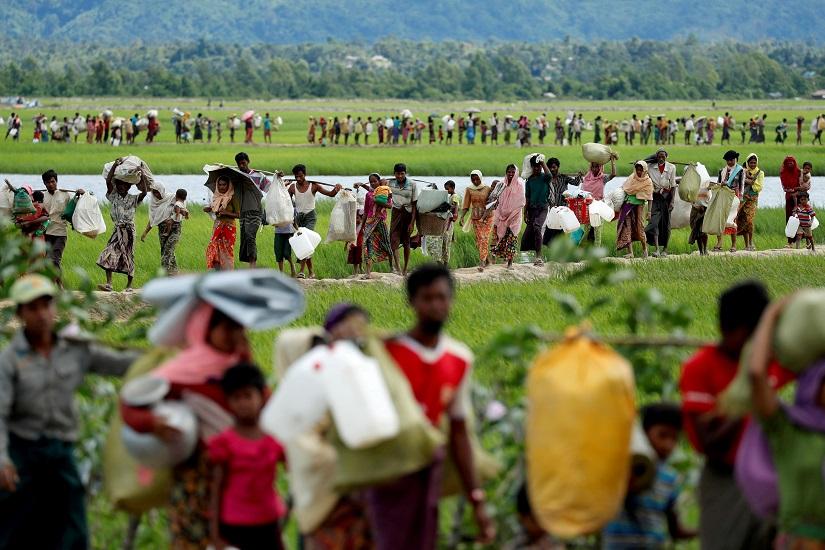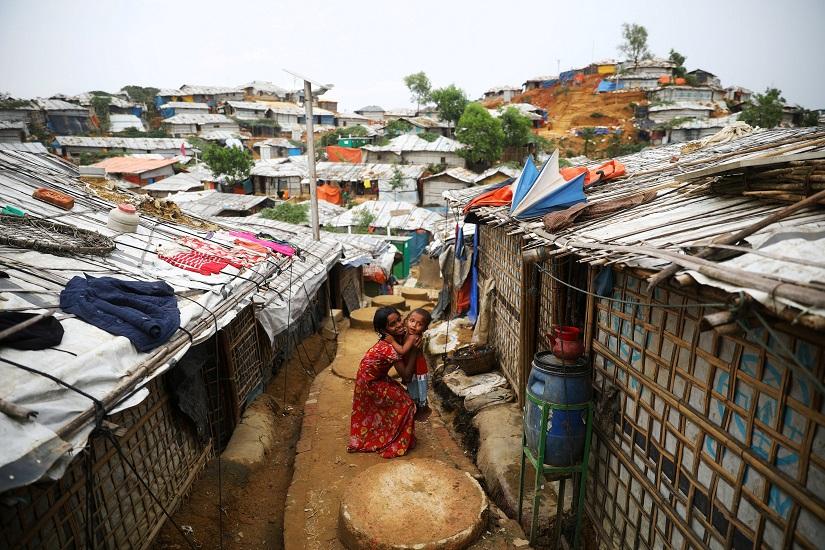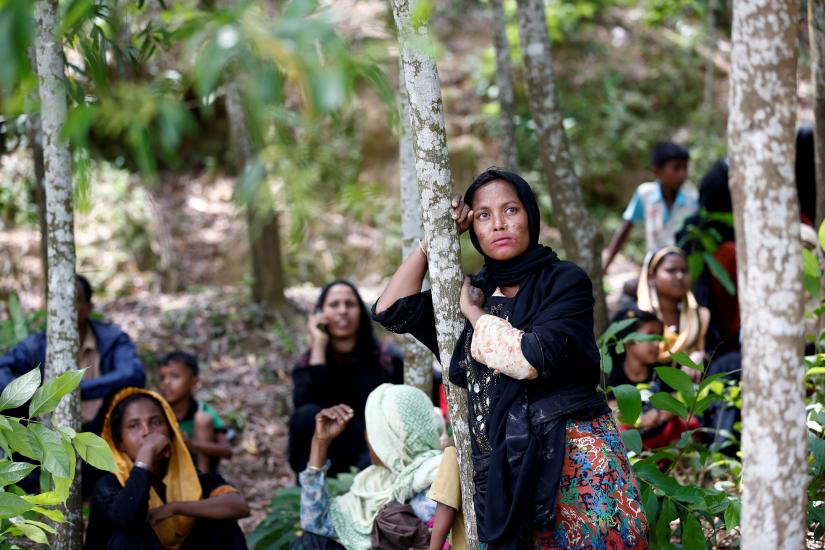 The Rohingyas have been facing persecution and denied basic rights by the Myanmar military in collaboration with the civil government led by Aung Sun Suu Kyi for decades now.
The Rohingyas have been facing persecution and denied basic rights by the Myanmar military in collaboration with the civil government led by Aung Sun Suu Kyi for decades now.
The systematic and targeted persecution forced 400,000 Rohingyas to flee Rakhine and take shelter in Bangladesh from 2012 to 2017.
On Aug 25, 2017, the Myanmar military began a full-scale crackdown on the Rohingyas as part of ethnic cleansing, forcing more than 700,000 of them to cross over to neighbouring Bangladesh.
As of 2019, Bangladesh is housing over one million Rohingyas at the refugee camps in Cox’s Bazar.
Allegations of carrying out rape, killing, arson and acts in violation of human rights have been brought against the Myanmar military that reportedly capitalised on the environment of horror it created to carry out a systematic ethnic cleansing.
Over 25,000 Rohingyas are estimated to have been killed while hundreds of women were raped and about 400 villages burnt down during the crackdown.
Bangladesh foreign office from the very beginning is engaged with Myanmar and the international community to ensure safe and dignified repatriation and accountability of the genocidal acts committed by Myanmar forces.
The International Criminal Court, International Court of Justice and Independent Investigative Mechanism (IIM) for Myanmar are the three entities working to bring the perpetrators to book.
They are also working with the foreign ministry so that Rohingyas can be repatriated and accountability ensured.
INTERNATIONAL CRIMINAL COURT
On Apr 9 last year, International Criminal Court Prosecutor Fatou Bensuda, in a written request sought a ‘ruling on a question of jurisdiction: whether the Court may exercise jurisdiction over the alleged deportation of the Rohingya people from Myanmar to Bangladesh.’
The prosecutor’s intention was to investigate and, if necessary, prosecute the alleged exodus of Rohingyas from Myanmar to Bangladesh.
May 7, 2018, the court on invited ‘the competent authorities of Bangladesh to submit written observations, either publicly or confidentially, on the Prosecutor’s Request.’
Bangladesh made a confidential submission after a month from the request but Myanmar who on Jun 21 of that year, was asked to submit its observation refused to comply.
On Sept 6 of last year, a favourable ruling from the court was made and the verdict acknowledged that ‘the process of reparations is intrinsically linked to criminal proceedings’.
Last month the ICC prosecutor requested the court for an authorisation to open the probe and the process is likely to begin after October.
A foreign ministry official said, “Now we are negotiating with the ICC to sign an agreement so that they can investigate in Bangladesh.”
Terming it as a routine procedure, he said, “Wherever the ICC prosecutors work, they need to sign this agreement with the host country.”
“It is up to the ICC when they would start an investigation but our understanding is that it would begin after October,” he said. INTERNATIONAL COURT OF JUSTICE
INTERNATIONAL COURT OF JUSTICE
The Organisation for Islamic Cooperation during a summit held this year urged the case Of Rohingyas to be launched at the International Court of Justice (ICJ).
The final communiqué of OIC summit meeting held in Mekkah on May 31 this year, said ‘In this connection, the Conference urged upon the ad hoc Ministerial Committee led by the Gambia to take immediate measures to launch the case at the International Court of Justice on behalf of the OIC.’
A foreign ministry official said, “The Gambia has already circulated its plan and we hope that it would start its work on how to formulate the case very soon.”
The official said, “The ICJ is different from the ICC as it deals with the country while the International Criminal Court deals with individuals”.
He added that a favourable verdict from ICJ will be a major boost in ensuring the human rights of the displaced Rohingyas.
INDEPENDENT INVESTIGATIVE MECHANISM (IIM) FOR MYANMAR
Independent Investigative Mechanism (IIM) for Myanmar is an initiative by Geneva-based Human Rights Council and was established in September last year to "collect, consolidate, preserve and analyse evidence of the most serious international crimes and violations of international law committed in Myanmar since 2011."
In April of this year, United Nations Secretary-General António Guterres announced the appointment of US prosecutor Nicholas Koumjian as the IIM chief. Koumjian has over 35 years of experience as a prosecutor including almost 20 years of experience in the field of international criminal justice.
Koumjian has over 35 years of experience as a prosecutor including almost 20 years of experience in the field of international criminal justice.
Another foreign ministry official said, “The UN has a similar mechanism for Syria and it is working well.”
The IIM operates independently of any court and will collect and analyse evidence but will not be responsible for any prosecution, he said.
He added that the IIM’s findings will be available in any case brought against Myanmar military or civil leaders, in any court including the ICC.
 National
National
30679 hour(s) 31 minute(s) ago ;
Morning 02:25 ; Wednesday ; Apr 17, 2024
Rohingya crisis: Three entities at work to ensure accountability
Send
Sheikh Shahariar Zaman
Published : 23:31, Aug 23, 2019 | Updated : 14:41, Aug 24, 2019
Published : 23:31, Aug 23, 2019 | Updated : 14:41, Aug 24, 2019
0 ...0 ...
/st/
- KOICA donates medical supplies to BSMMU
- 5 more flights to take back British nationals to London
- Covid19: Rajarbagh, Mohammadpur worst affected
- Momen joins UN solidarity song over COVID-19 combat
- Covid-19: OIC to hold special meeting
- WFP begins food distribution in Cox’s Bazar
- WFP begins food distribution in Cox’s Bazar
- 290 return home to Australia
- Third charter flight for US citizens to return home
- Dhaka proposes to postpone D8 Summit
Unauthorized use of news, image, information, etc published by Bangla Tribune is punishable by copyright law. Appropriate legal steps will be taken by the management against any person or body that infringes those laws.
Bangla Tribune is one of the most revered online newspapers in Bangladesh, due to its reputation of neutral coverage and incisive analysis.
F R Tower, 8/C Panthapath, Shukrabad, Dhaka-1207 | Phone: 58151324; 58151326, Fax: 58151329 | Mob: 01730794527, 01730794528


